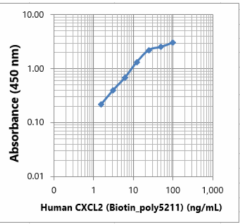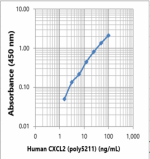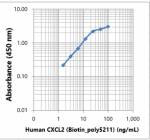- Clone
- Poly5211 (See other available formats)
- Regulatory Status
- RUO
- Other Names
- Gro2, Macrophage inflammatory protein (MIP-2)
- Isotype
- Goat Polyclonal IgG
- Ave. Rating
- Submit a Review
- Product Citations
- publications

-

Direct ELISA showing biotin anti-human CXCL2 (clone Poly5211) bound to plate-immobilized recombinant human CXCL2 protein (Cat. No. 582002). The wells were incubated with serially diluted biotin primary antibody at room temperature for 2 hours in 1% BSA-PBS, followed by incubation with HRP Avidin (Cat. No. 405103). TMB substrate (Cat. No. 421501) was used fordetection. Absorbance was measured at 450 nm.
CXCL2 is an ELR CXC chemokine, and it is structurally and functionally related to GRO1 (CXCL1), GRO3 (CXCL3), and interleukin-8 (CXCL8). CXCL2 binds to the CXCR2 receptor; this receptor is shared with other ELR CXC chemokines (CXCL1, CXCL3, CXCL5, CXCL6, CXCL7, and CXCL8). CXCL2 is highly expressed in esophageal squamous cell carcinoma (ESCC), and it has been detected in serum of patients with this disease. CXCL1, CXCL2 and CXCL3 have all been shown to be highly expressed in patients with malignant melanoma. In addition, CXCL2 and CXCL1 are upregulated in the central nervous system in multiple sclerosis (MS) and in the animal model of experimental autoimmune encephalomyelitis (EAE). In EAE, it has been shown that transfer of encephalitogenic CD4+ Th17 cells induce CXCL1 and CXCL2 transcription in the spinal cords of naïve, syngeneic recipients. IL-17 is a potent inducer of ELR+ CXC chemokines in MS and EAE. It has been proven that CXCL1 and CXCL1 are upregulated in the preclinical and clinical stages of EAE.
Product DetailsProduct Details
- Verified Reactivity
- Human
- Antibody Type
- Polyclonal
- Immunogen
- Human Recombinant CXCL2 Protein
- Formulation
- Phosphate-buffered solution, pH 7.2, containing 0.09% sodium azide
- Preparation
- The antibody was purified by affinity chromatography and conjugated with biotin under optimal conditions.
- Concentration
- 0.5 mg/mL
- Storage & Handling
- The antibody solution should be stored undiluted between 2°C and 8°C. Do not freeze.
- Application
-
Direct ELISA
- Recommended Usage
-
Each lot of this antibody is quality control tested by Direct ELISA. The optimal concentration of this reagent for the specific application and the experiment design should be established by the end-user.
- Additional Product Notes
-
This product is intended for sandwich-based immunoassay development on various assay platforms requiring antibody pairs. This antibody (clone Poly5211) could function as a detection antibody when paired with purified anti-human CXCL2 antibody (Cat. Nos. 311001 and 311002) (clone A16108E) as the capture antibody and using Recombinant Human CXCL2 (Groβ) protein (Cat. No. 582002) as the assay standard.
- RRID
-
AB_3083210 (BioLegend Cat. No. 521103)
Antigen Details
- Structure
- Chemokine
- Distribution
-
Macrophages, monocytes, fibroblasts, and epithelial cells
- Function
- CXCL2 chemoattracts and activates neutrophils, and it plays a key role in neutrophil mobilization from the bone marrow. CXCL2 is induced by TNFα, IL1α, IL-17, and LPS.
- Interaction
- Neutrophils, basophils, lymphocytes, monocytes, keratinocytes, hematopoitic cells, endothelial cells, bone marrow endolthelial cells, osteoblasts, epithelial cells, fibroblasts, melanoma cells, melanocytes, and neurons.
- Ligand/Receptor
- CXCR2
- Biology Area
- Cell Biology, Signal Transduction
- Molecular Family
- Cytokines/Chemokines
- Antigen References
-
- Haskill S, et al. 1990. P Natl Acad Sci USA. 87:7732.
- De Plaen I, et al. 2006. Immunology. 118:153-63.
- Carlson T, et al. 2008. J Exp Med. 205:811-23.
- Eash KJ, et al. 2010. J Clin Invest. 120:2423-31.
- Keeley EC, et al. 2011. Exp Cell Res. 317:685-90.
- Onishi RM and Gaffen SL. 2011. Immunology. 129:311-21.
- Gene ID
- 2920 View all products for this Gene ID
- UniProt
- View information about CXCL2 on UniProt.org
Related FAQs
- How many biotin molecules are per antibody structure?
- We don't routinely measure the number of biotins with our antibody products but the number of biotin molecules range from 3-6 molecules per antibody.
Other Formats
View All CXCL2 Reagents Request Custom Conjugation| Description | Clone | Applications |
|---|---|---|
| Purified anti-human CXCL2 | Poly5211 | Direct ELISA |
| Biotin anti-human CXCL2 | Poly5211 | Direct ELISA |
Compare Data Across All Formats
This data display is provided for general comparisons between formats.
Your actual data may vary due to variations in samples, target cells, instruments and their settings, staining conditions, and other factors.
If you need assistance with selecting the best format contact our expert technical support team.
-
Purified anti-human CXCL2

Direct ELISA showing purified anti-human CXCL2 (clone Poly52... -
Biotin anti-human CXCL2

Direct ELISA showing biotin anti-human CXCL2 (clone Poly5211...











Follow Us